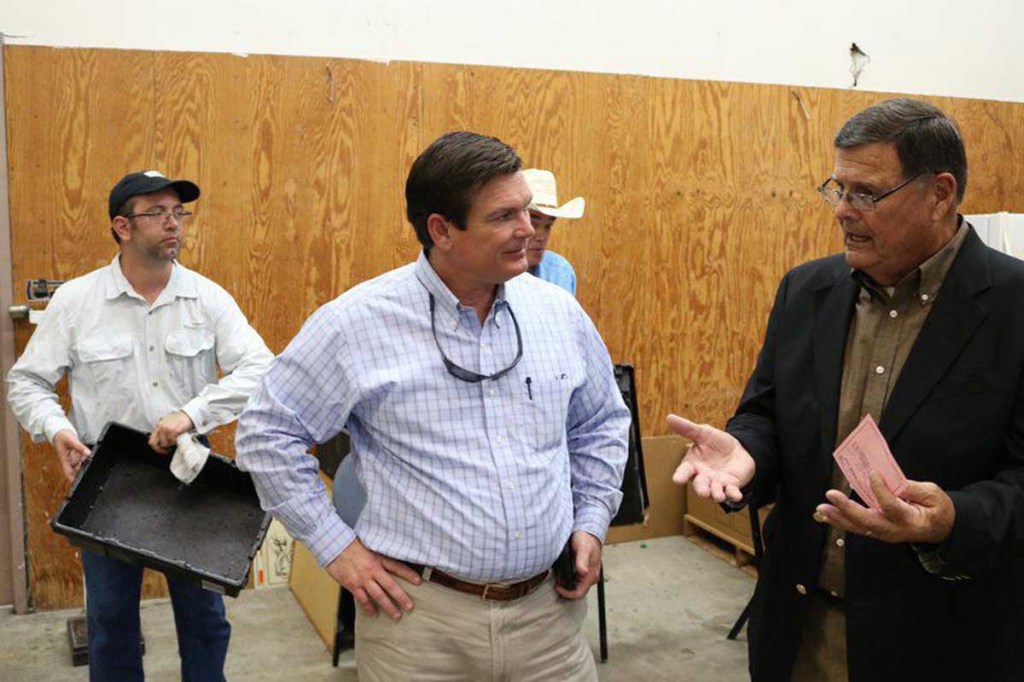Congressman visits Valdosta non-profit
Published 9:30 am Thursday, April 18, 2019

- Derrek Vaughn | The Valdosta Daily TimesU.S. Rep. Austin Scott speaks with Dr. Harry Hamm, executive director with Lowndes Advocacy Resource Center. Scott toured both LARC facilities Wednesday to listen to their concerns.
VALDOSTA — U.S. Rep. Austin Scott toured the Lowndes Advocacy Resource Center Wednesday to learn more about the non-profit’s needs and concerns.
Scott’s visit was spurred by Dr. Ruth Stonestreet, a local speech-language pathologist who went to Washington, D.C., in March to advocate for local organizations such as LARC.
In Washington, she met with Scott’s people and invited them to visit the facility in Valdosta the next time he was in town.
A Tifton resident, Scott had no trouble taking the time to see LARC’s recycling center at 901 W. Hill Ave. and its main workshop at 1646 E. Park Ave.
LARC, an agency that serves individuals with disabilities, works to improve the quality of life of each person they serve, according to the agency’s website.
Based on the client’s choice, LARC provides support on the job, at home or at various sites in the community. Support and training are designed to enable people to experience success and pleasure in life.
“We’re down here with the Lowndes Advocacy Resource Center, seeing their facilities and meeting with their clients. It’s a wonderful organization and doing a lot to help people,” Scott said. “We have a lot of people out there with developmental disabilities, and certainly, we want to find ways to help them. It’s been a great opportunity to visit with them and see this operation.”
Dr. Harry Hamm, LARC executive director, said they reached out to people in D.C., including U.S. Sens. Johnny Isakson and David Perdue, about two major issues affecting their agency.
One issue is the trade war between the U.S. and China, which is affecting the sell of LARC’s recycled cardboard.
“We recycle cardboard at our other facility, and we’re the largest private recycler in the southeast,” Hamm said. “We employ 20 people with disabilities there everyday. We recycle millions of pounds of cardboard.”
China is no longer buying their cardboard, putting LARC employees in jeopardy of loosing their job. This has caused the price to plummet, making it too expensive to sell the cardboard.
Hamm said LARC is stockpiling the cardboard in hopes the market will turn like it has in the past. He said he would like to see Scott encourage Congress to form a trade agreement with China and other countries not aligned with the U.S.
“I trust (the president) to do what he is doing,” Hamm said. “It just impacts us and we live with it.”
Scott said markets go through cycles and the cardboard market is down right now.
The other issue affecting LARC is the 14C rule about sub-minimum wage payment to people from the department of labor.
Hamm said LARC holds a sum-minimum wage federal certificate that allows it to pay less than minimum wage to its workers.
“They are paid based on their ability and their productivity level, which is in most cases below minimum wage,” Hamm said. “People who have Congress’ ear are threatening to do away with the 14C, which means we would have to pay everyone minimum wage, which means we’d have no work.”
This would put many LARC clients without a job, something they rely on for stability and purpose, Hamm said.
For Scott, he said the side in favor of keeping 14C and the side against it, may both have good intentions. He argues, however, that any rule or regulation that gets in the way of helping and providing services to people with developmental disabilities is something Congress needs to look at.
“We need to make it easier for people like this resource center to provide those services,” Scott said. “The people who work here have value and take pride in their work, and I think it is a wonderful mission.”
After touring the facilities and speaking with Hamm and the other people with LARC, Scott said the most important thing people in Washington can do for their constituents is take the time to meet with them and listen to their thoughts and concerns.
He said many people in Washington begin with the best intentions, but pass laws with unintended consequences.
“The main thing you need to do is listen to them,” Scott said. “They are able to tell us where the rules and regulations are coming from and what the threats to them are.”
Thomas Lynn is a government and education reporter for The Valdosta Daily Times. He can be reached at (229)244-3400 ext. 1256



